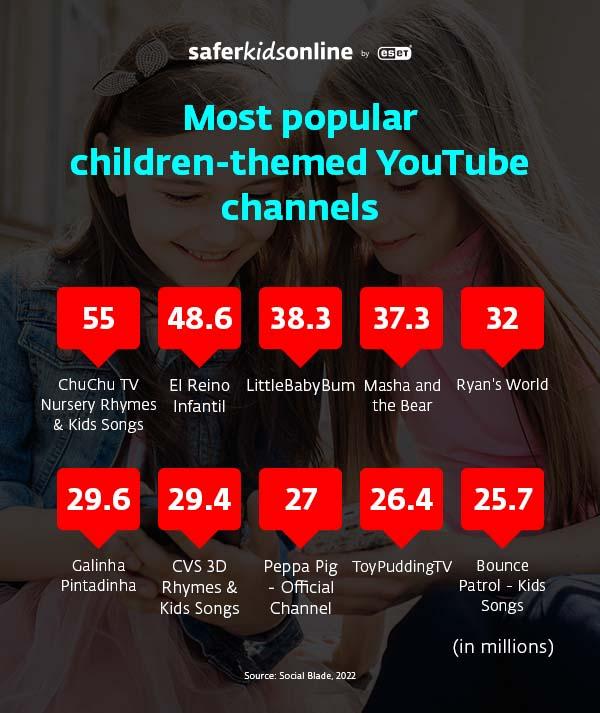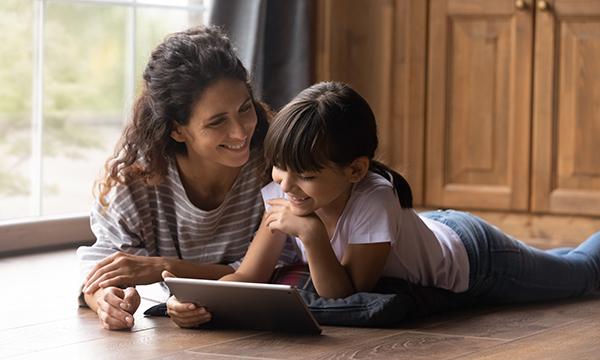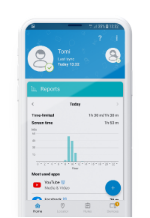According to ESET’s Safe and Social 2021 survey, YouTube is the most popular social media platform for kids in Australia. Additionally, 96.3% of the children surveyed reported that using YouTube makes them happy. While these results include data from only one country, YouTube’s worldwide popularity among kids is undeniable. The app can be used to educate children, to help them pass the time while waiting or on long travels or to develop their creativity, but there are still some dangers that parents should take into consideration. Explicit content, misinformation and cyber-bullying are not rare on YouTube. How can you prevent these issues from affecting your child?

1.) Talk, listen, explain
Your approach towards YouTube will probably have to adjust according to your child’s age. While younger children need thorough and attentive monitoring, older kids may require more freedom of choice. However, no matter your child’s age, it is beneficial to openly communicate your views while also listening to your child’s wishes. You may explain your worries to your child and tell them why you think it is better for them to avoid specific types of videos. Take into account the various issues that can be associated with different types of content: unboxing videos may support your child’s urge to buy a uselessly large number of toys, some videos may capture video games that contain violence, YouTube challenges may be dangerous for your child… On the other hand, be willing to learn what your child watches online and let them explain the appeal of their favorite content to you. Then, adapt your rules to manage the different possible risks.
Ask your child these questions: What do you like to see on YouTube? When do they spend time on the app? Talk with them about YouTube and try to understand why they find certain content amusing or interesting. Understanding your child’s desires may make it easier for you to create rules that they will be willing to oblige to. Psychologist Jarmila Tomková also adds that younger children may appreciate your supervision: “Don’t be afraid to oversee your child’s behaviour on YouTube. You don’t have to do it behind their back, openly explain your protective actions as well as your motivations. Young kids may actually appreciate being monitored – it calms them and they see it as a sign that you care for their well-being.” Finally, don’t forget to discuss commenting as well: your children should not leave any hateful comments online or even react to any such comments they may encounter. If they would, for instance, try to protect their favorite influencer, they may receive more hateful responses which could be difficult to process at their age. When your child encounters hateful or disturbing comments online, encourage them to come to you. Together, you can react to the situation – for instance by reporting the comments. This helps your child to respond to unpleasant situations without feeling burdened by having to solve them all alone. You can also use these moments to discuss your child’s emotions and offer your support.
What do children usually watch on YouTube?
• Let’s Plays: usually live narration of players playing video games, Minecraft is especially popular among younger children
• Unboxings: videos that capture users opening different types of goods, such as games, toys or collectibles
• Makeup and Fashion: some popular formats include hauls (videos of users presenting their new clothes, makeup, accessories, etc.), Get Ready With Me videos (showing users preparing their outfits or putting on makeup), daily routines or tutorials
• Arts and crafts: many YouTube videos can be used to develop viewers’ creative skills, including painting, drawing, crocheting, photography, etc.
• Vlogs: some users produce video blogs that capture their regular daily activities, or their opinions on specific topics
• Fun channels: these contain parodies, challenges, skits or even videos capturing users reacting to funny content
• Cartoons: there are channels dedicated to this type of content, such as Animated Cartoons for Children by Dreamworks animation
• Educational channels: YouTube can actually benefit your child’s learning, some popular educational channels include Khan Academy Kids, Bright Side, or Kid’s Learning Tube
|
2.) Use restricted YouTube and YouTube Kids
YouTube has previously stated that the platform is not intended for users under the age of 13. In their attempts to protect young viewers from explicit content, the restricted version of YouTube is the default for any users under 18 as well as those who are not signed into the app. Any content uploaded to YouTube needs to follow YouTube community guidelines, but some videos may be tagged as suitable for mature audiences only due to explicit language or content. These videos should not come up in the search bar, and cannot be accessed in the restricted mode. Unfortunately, YouTube’s restricted mode is not customizable, which means that parents cannot adjust its settings to their own preferences and needs.
In 2015, YouTube has come up with a separate app named YouTube Kids, which is targeted mainly at preschool children. Videos on this platform undergo specific inspection and can only contain topics suitable for younger audiences. Still, there have been some accidents related to harmful content that managed to get uploaded onto the app. On YouTube Kids, parents can create accounts for their children, specify their age, filter the content, and see what their kids consume. The app offers videos that are suitable for the child’s age group, dividing the content into 6 categories.
YouTube Kids homescreen categories
• Shows: includes kid-friendly programming from popular YouTube creators, family media networks, as well as both new and nostalgic characters
• Music: includes nursery rhymes, kid-friendly song covers, dance tutorials, and sing-alongs
• Learning: includes content to promote fun, active learning: from ABCs and 123s, to science experiments and language learning
• Explore: includes content that inspires children to explore the world around them, develop new hobbies, and explore topics that interests them
• Gaming: includes content featuring kids' favorite video games and gamers, this category is only shown if you've selected the Older content setting for your child
• Shared: includes all of the channels and videos on YouTube that you’ve shared with your child, this category only shows if you’ve shared content with them from YouTube.
Source: YouTube Kids Parental Guide, 2022
|
Using the YouTube Kids platform may make it easier for you to prevent your child from seeing inappropriate content, yet it is still advisable that you monitor your kids while they use the app.
While YouTube Kids is suitable for younger children, tweenagers (10-13) may no longer find its content appealing, and yet they may still be too young to wander around the full version of YouTube without supervision. In their case, YouTube encourages parents to try their supervised experience account. This will enable parents to monitor their kids, adjust their settings and let their children start to explore YouTube more safely. There is less advertising content in the supervised experience version of YouTube, parents can adjust content settings to fit their tween’s age, and children are restricted from commenting or creating their own videos. YouTube is said to be working on making self-expression on YouTube possible for tweenagers in a safe, regulated way.
3) Actively personalize the platform
An easy way to make sure your child only watches safe content is to create playlists of videos that you have pre-approved. You can also disable search on YouTube Kids so that your children cannot look for unapproved content by themselves. When you come across channels that you find interesting and suitable for your child, you can subscribe to them and get early access to their new videos. Additionally, you may try pausing watch history (both on YouTube and YouTube Kids), which will stop the app’s algorithm from recommending videos to your children. However, always watching the same content can be boring, so let your child know that if they want to find new channels or videos, you can look for them together.

4) Empower children
When you give your child opportunity to express their thoughts and desires, they may be more willing to hear your worries and understand your concerns. Learn about the content they want to watch and whenever possible try to find reasonable solutions to their requests. If you want to create personalized playlists for their use, you can do it with them by your side. Even giving your child some seemingly unimportant task – such as naming the playlists – can make them feel more included in the process of creating the best YouTube environment for them. You should also teach and encourage your child to block inappropriate channels or report any videos that they find harmful or hateful, which may help them feel more in control of their own watching experience.

5) Use a parental control app
Apart from taking the time to monitor your child’s behavior on YouTube and counting on the app’s ability to filter harmful content, you can opt for a smart helper that can aid you in protecting your children online – a parental control app. These can assist you in putting your rules into practice, and making it more difficult for unsuitable content to reach your child. For instance, the ESET Parental Control App can prevent your kids from exceeding their allocated time on YouTube or view inappropriate pages and videos.





